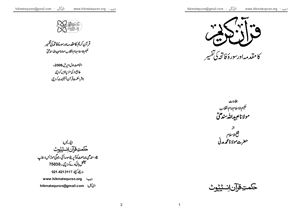Karachi: Hikmat-i Qur'an Institute, 2008. — 48 p. (in Urdu)
Maulana Ubaidullah Sindhi (10 March 1872—22 August 1944) was a
noted Islamic leader, a political activist of the Indian
independence movement.
Bo in a Sikh family of Sialkot, Ubaidullah converted to Islam early in his life and later enrolled in the Darul Uloom Deoband, where he was at various times associated with other noted Islamic scholars of the time, including Maulana Rasheed Gangohi and Mahmud al Hasan. Maulana Sindhi retued to the Darul Uloom Deoband in 1909, and gradually involved himself in the pan-Islamic movement. During World War I, he was amongst the leaders of the Deoband school who, led by Maulana Mahmud al Hasan, left India to seek support of the Central Powers for a Pan-Islmaic revolution in India in what came to be known as the Silk Letter Conspiracy.
Ubaidullah reached Kabul during the war to rally the Afghan Amir Habibullah Khan, and after brief period, he offered his support to Raja Mahendra Pratap's plans for revolution in India with German support. He joined the Provisional Govement of India formed in Kabul in December 1915, and remained in Afghanistan till the end of the war, and left for Russia. He subsequently spent two years in Turkey and, passing through many countries, eventually reached Hijaz (Saudi Arabia) where he spent about fourteen years leaing and pondering over the philosophy of Islam especially in the light of Shah Waliullah's works. In his early career was a pan-Islamic thinker. However, after his studies of Shah Waliullah's works, Ubaidullah Sindhi emerged as non-Pan-Islamic scholar.
He was one of the most active and prominent members of the faction of Indian Freedom Movement led by Muslim Clergy chiefly from Islamic School of Deoband.
Bo in a Sikh family of Sialkot, Ubaidullah converted to Islam early in his life and later enrolled in the Darul Uloom Deoband, where he was at various times associated with other noted Islamic scholars of the time, including Maulana Rasheed Gangohi and Mahmud al Hasan. Maulana Sindhi retued to the Darul Uloom Deoband in 1909, and gradually involved himself in the pan-Islamic movement. During World War I, he was amongst the leaders of the Deoband school who, led by Maulana Mahmud al Hasan, left India to seek support of the Central Powers for a Pan-Islmaic revolution in India in what came to be known as the Silk Letter Conspiracy.
Ubaidullah reached Kabul during the war to rally the Afghan Amir Habibullah Khan, and after brief period, he offered his support to Raja Mahendra Pratap's plans for revolution in India with German support. He joined the Provisional Govement of India formed in Kabul in December 1915, and remained in Afghanistan till the end of the war, and left for Russia. He subsequently spent two years in Turkey and, passing through many countries, eventually reached Hijaz (Saudi Arabia) where he spent about fourteen years leaing and pondering over the philosophy of Islam especially in the light of Shah Waliullah's works. In his early career was a pan-Islamic thinker. However, after his studies of Shah Waliullah's works, Ubaidullah Sindhi emerged as non-Pan-Islamic scholar.
He was one of the most active and prominent members of the faction of Indian Freedom Movement led by Muslim Clergy chiefly from Islamic School of Deoband.

